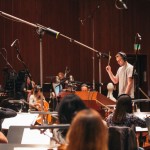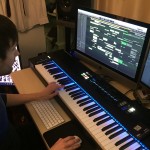Well, here we are again. Another year, a bigger E3, and boy, I’m already pooped. I spent most of the day staring in awe at the Nintendo booth, not knowing what to start with, but eventually made my way over to the Konami booth to check out Silent Hill: Shattered Memories and Vandal Hearts. As it turned out, we were in luck, as Shattered Memories producer Tomm Huelett was on hand to talk to us about the game’s music and audio direction.
I’m happy to report that the title will feature a blend of old and new. There are some familiar names involved with the game’s score as well as a few surprises regarding vocal themes and the technology behind the game’s sound, so join us as we learn what’s in store for fans from Silent Hill: Shattered Memories this fall.
Our interview with Tomm Huelett is waiting for you after the jump.
OSV: So Tomm, it’s great to see you. The last time we spoke with you, you were the Associate Producer for Contra 4. It sounds like you’re the main man for Silent Hill: Shattered Memories, so congratulations. The most obvious question is, of course, will Akira Yamaoka be returning to score the game?
Huelett: Yes! And there’s an exciting thing I can tell you. One of the songs that he’s doing is a cover of “Always on my Mind,” which has been covered by Elvis and Sheryl Crow. Since the game is a re-imagining of Silent Hill, we had him re-imagine this classic song, so it’s the song for the trailer.
OSV: And how did this come to happen?
Huelett: It fit into the whole re-imagination thing. You know the game is a re-imagining of Silent Hill 1, but it’s totally different, so the developer came up with the idea to have this song, and it’s featured in the game also, it’s not just a publicity thing. We licensed the song, had Akira do a version unlike any version you’ve ever heard, so then it made sense to use it in our trailer because it communicates the idea of, “Hey, this is something you know, it’s Silent Hill 1, but you don’t know it, it’s something new.”
OSV: Awesome. So can we expect to hear the voice of Mary Elizabeth McGlynn?
Huelett: Yes, she sings on that song and the other vocal songs in the game.
OSV: Are we expecting to hear numerous vocal tracks this time around?
Huelett: Yes.
OSV: So what is the overall music direction for the title? I know that Yamaoka-san used to have a more hands-on approach with the series as the producer and composer, and with Homecoming, he was responsible only for the music. So this time, he’s just handling music again?
Huelett: Early on we met with him and told him, “This is what we’re doing with the game, this is what we’re going for with the plot, make some music!” The cool thing about this that affects how he composes is that the audio in the game is dynamic. So, usually his music is made up of little sounds and things that repeat, so if your tension in the game is low, you might just hear one cymbal, but then something happens, like you’re in a puzzle that you’re stuck on or there’s an enemy or something, and your tension ramps up, it adds more channels in. This makes sure that during the nightmare scenes where you’re being chased by monsters, there’s this cacophonous sound and when you lose the creatures and they’re looking for you, it kind of calms down. This is very important to the game. While other Silent Hill games did this, it was scripted before, and now it depends entirely upon what you’re doing. So he’s composing like that. So beyond explaining that system and telling him what we’re doing, we kind of gave him free reign. You know, the Silent Hill soundscape is kind of in his head, so it’s whatever he feels. There are some songs that recall older melodies, and others that don’t, that are all new, but nothing is recycled.
OSV: So we’ll hear some remixes or arrangements of music from the original Silent Hill, but how about other games throughout the series?
Huelett: I think there are some songs that recall other places in the series. It’s not just Silent Hill 1. The advantage of working with him is that we have all his music. So when we’re creating the game, or Climax is creating the game, they can put in all his music from the old games and say, “This should sound like this.” There was one song I got used to hearing in a certain scene.
OSV: Oh, like a temp score thing?
Huelett: Yeah, one of the songs he turned in was that song but remixed, so it was like, “Oh, wow, so now it’s still in the game.” So there are some things from various points in the series.
OSV: Very cool. I know a lot of fans will be really happy. Yamaoka-san’s favorite score is Silent Hill 2, so maybe he’ll work in some of those tracks in this case. Do you know at this point how much music will be written for the game?
Huelett: It’s about on par with the previous games.
OSV: So about one disc worth?
Huelett: Yeah.
OSV: And I know with Homecoming, there was a promotional soundtrack disc that was given to gamers who picked up it up at GameStop and some other stores. Will there be something similar this time around?
Huelett: Well, that’s not really up to me, so I don’t have an answer. I certainly hope so, as I like having the CDs.
OSV: You wouldn’t have any idea what the deal was with the Homecoming disc? We had interviewed Yamaoka-san before the Homecoming release, and he had said that the soundtrack would be available by the end of September, which was the game release. We didn’t see it, so people assumed he meant the game, and not the soundtrack, but two months later, the disc finally showed up at GameStop. Was that a delayed promotion that was supposed to be ready for the launch of the game?
Huelett: There are a lot of early plans that never happen with any game, so Akira was probably speaking to one of those promotions.
OSV: Ah, okay. As far as the sound on the Wii, was it challenging tailoring the game’s sound to the system? I know on the PS3 and Xbox 360, there is high-definition sound, but on the Wii, that’s not possible. How has this factored into Shattered Memories?
Huelett: Well, on my end, it’s a similar process. I mentioned that this time around we’re doing the dynamic music which allows for lots of cool next-gen stuff, and I know Akira purchased some new equipment to work on the Wii. But as far as getting the music, it doesn’t seem like there’s a different process. We send our request to Akira, he sends us the track, we give him feedback, he sends us the final track.
OSV: How often are you communicating with him about rewrites and stuff like that? Does he do rewrites? Who approves it?
Huelett: I approve it, and the developer helps approve it, but there hasn’t been any rewrites. Once in awhile we get a song that sounds like this, and we’ll say, well, this doesn’t really fit this scene, but we can use it over here. So he writes a bunch of music and we can usually fit it in somewhere.
OSV: So I know that Yamaoka-san has always said in the past that he wants gamers who enjoy Silent Hill with headphones. As the title’s producer, do you feel that headphones offer a more immersive experience? Do you think it’s an important element with this Silent Hill?
Huelett: Yeah, you definitely need to be surrounded by the music. It’s a big portion of what Silent Hill is. But we also have sound coming through the Wii Remote speaker, so I’m not sure how that’d work with headphones. I guess you could turn the speaker all the way up, and turn down your earphones, but.
OSV: That’s a good point. So the microphone in the Wii Remote is being utilized in the game. So what can you tell us about the sound and how the controller factored into it?
Huelett: When we were first thinking about what we could on the Wii with Silent Hill, the two biggest trademarks are the flashlight and the static.
OSV: I’m sure the first thing you guys thought is, “Hey, we need to get the balance board in this game!” Right? [Laughs]
Huelett: [Laughs] Not quite.
OSV: And the Wii Zapper? [Laughs]
Huelett: [Laughs] Well, you have a flashlight with the remote, it’s pretty obvious, and then you can have the static come out of the microphone, so right there in your hand is everything that has to be in Silent Hill. So we do have static when there are creatures nearby, and it also factors into puzzles. There are lots of hidden elements in the exploration that you might have to take a picture of or track down, and the static in the Wii Remote signals that. Also, if you make a phone call with the Wii Remote, you hold it up to your ear and you hear it in the speaker.
OSV: Oh, okay. This makes a whole lot more sense now because I was just playing the game out on the floor with the headphones, because you can’t hear anything out there, and I was trying to take pictures and answer phone calls and couldn’t hear anything!
Huelett: Yeah, it’s a little bit hampered by the realities of E3, but it adds a lot to the immersion when you’re playing at home. When you’re doing puzzles, there are also sounds. There’s a puzzle where there’s a key inside of a can, so you’re shaking cans to find the key, and you’ll hear the key rattling in the speakers, and it feels like you’re holding the can, shaking it, and hearing the key, so it really adds to the experience.
OSV: Are these sounds channeled into the regular speakers as well, and are amplified on the remote?
Huelett: The puzzle sounds are amplified through the remote, but the phone is only on the remote. The static is on the screen, actually, there’s a VHS effect, but the sound is primarily on the remote.
OSV: So it doesn’t sound like a headphones-friendly experience.
Huelett: Depending on the headphones. Maybe earbuds. Sound-canceling headphones no.
OSV: So this is being developed by Climax, the team who handled Origins. Was it ever under consideration to have anyone other than Yamaoka-san do the music?
Huelett: No.
OSV: We’ve talked to him in the past and he said the day he doesn’t write music for Silent Hill is the day that the series is so different from what it originally was that he doesn’t even want to be involved with it anymore. So it’s good that he’s still involved, which means he feels it’s staying true to the core franchise. It must be a really exciting time for you. Is there anything else you want to say about the audio that you might think is interesting?
Huelett: I’m just hoping that the dynamic music system really draws people into the game in a way that they haven’t been before. And it’s not going to be a conscious thing, like, “Hey, the music just dropped out.” But hopefully you look back on your playthrough and think, wow, the music really added to the experience.
OSV: Lastly, what is your favorite Silent HIll song or track, vocal theme, or whatever?
Huelett: There’s a song in Silent Hill 2 that I think is called “Love Song,” and it sounded like Akira wanted to make that a vocal song before they were putting them in the games. I mean, I wasn’t on the series then, so I have no idea what the details are, but to me, it sounds like a vocal song, so I like that one because I can imagine what it would have sounded like with lyrics.
OSV: Well, you missed out on your chance. As the producer, you should have said, “Yamaoka-san, I’d love to request some vocals in that track from Silent Hill 2.” [Laughs]
Huelett: [Laughs]
OSV: So you missed the opportunity.
Huelett: Yeah.
OSV: Well, awesome. Congratulations. We’re really looking forward to the game. It’s out this fall. And hopefully we’ll hear about a soundtrack, and hopefully you’ll tell us right away if it’s going to happen.
Huelett: Sure, and be sure to watch out for the trailer with the song this week.
Tags: E3 2009, Interviews, Konami, Shattered Memories, Silent Hill, Survival Horror, Videogame









































[…] Especially with the confirmation that Akira Yamaoka is back to compose the game as noted in the interview we had with SHSM producer Tomm Huelett at E3 […]
[…] guys! While looking for interviews to add to the site I came across an OSV interview with Tomm Hulett from way back in June 2009. Lots of neat tidbits about the music from the game and working with […]
I must thank you for the efforts you’ve put in writing this website.
I am hoping to see the same high-grade content from you
later on as well. In fact, your creative writing abilities has motivated me to get my very own site now
Hello there I am so glad I found your blog page, I really found you by mistake,
while I was researching on Askjeeve for something else, Anyhow I
am here now and would just like to say thanks
for a marvelous post and a all round entertaining blog (I also love the theme/design), I don’t have
time to go through it all at the moment but I have bookmarked it and
also added in your RSS feeds, so when I have time I will be back to read
a lot more, Please do keep up the awesome work.
Hi there, this weekend is good in support
of me, since this point in time i am reading this great educational
paragraph here at my residence.
I every time spent my half an hour to read this web site’s content everyday along with a cup of coffee.
Sweet blog! I found it while browsing on Yahoo News.
Do you have any tips on how to get listed in Yahoo News?
I’ve been trying for a while but I never seem to get there!
Thank you
Hello, i believe that i saw you visited my web site thus i got here to return the favor?.I am attempting to find
things to improve my web site!I guess its adequate to make use of a few of your
ideas!!
It’s amazing for me to have a site, which is good for my know-how.
thanks admin
Have you ever considered writing an e-book or guest authoring on other websites?
I have a blog based upon on the same information you discuss and would love to have you share some stories/information. I know my viewers would appreciate your
work. If you are even remotely interested, feel
free to shoot me an e-mail.
I think this is one of the most important info for me.
And i am glad reading your article. But should remark on some
general things, The web site style is perfect, the articles is really nice : D.
Good job, cheers
I couldn’t refrain from commenting. Very well written!
This article will help the internet visitors
for building up new web site or even a weblog from start to end.
I needed to thank you for this excellent read!! I certainly enjoyed every bit of
it. I have got you book marked to check out new things you post…
Hi there to every body, it’s my first visit of this web site;
this webpage includes amazing and genuinely excellent material for readers.
Whoa! This blog looks just like my old one!
It’s on a totally different topic but it has pretty much the same page
layout and design. Superb choice of colors!
I blog often and I seriously appreciate your information. This
article has really peaked my interest. I am going to take a note of your site and keep checking for new details about once a week.
I opted in for your Feed too.
Thanks for some other great post. The place else could anyone get that type of information in such an ideal approach of writing?
I have a presentation next week, and I am on the search for such
information.
Quality articles or reviews is the secret to attract the users to visit the web site, that’s what this site is providing.
Hey! This is my first visit to your blog! We are a group of volunteers and starting a new initiative in a
community in the same niche. Your blog provided us useful information to work
on. You have done a extraordinary job!
Hi there to every one, since I am genuinely eager of reading this blog’s post to be updated
regularly. It carries nice stuff.
Hello just wanted to give you a quick heads up. The text in your article seem to be running off the screen in Opera.
I’m not sure if this is a format issue or something to do with browser compatibility
but I figured I’d post to let you know. The design and style look great
though! Hope you get the problem fixed soon. Thanks
My coder is trying to persuade me to move to .net from PHP.
I have always disliked the idea because of the costs.
But he’s tryiong none the less. I’ve been using Movable-type on a number of websites
for about a year and am worried about switching to another
platform. I have heard fantastic things about blogengine.net.
Is there a way I can transfer all my wordpress posts into it?
Any help would be greatly appreciated!
Hi there just wanted to give you a quick heads up and let you know a
few of the images aren’t loading correctly. I’m not sure why but I think its a linking
issue. I’ve tried it in two different web browsers and both show the same outcome.
Ahaa, its pleasant discussion on the topic of this post here at this web site, I have read all that, so now
me also commenting here.
I have read so many articles concerning the blogger lovers but this post
is actually a good post, keep it up.